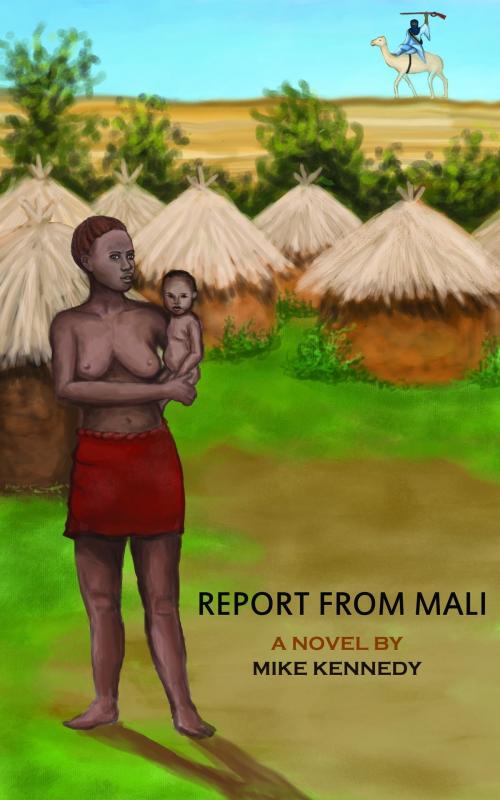| Author: | Mike Kennedy | ISBN: | 9781310447167 |
| Publisher: | Mike Kennedy | Publication: | August 29, 2014 |
| Imprint: | Smashwords Edition | Language: | English |
| Author: | Mike Kennedy |
| ISBN: | 9781310447167 |
| Publisher: | Mike Kennedy |
| Publication: | August 29, 2014 |
| Imprint: | Smashwords Edition |
| Language: | English |
One million Tuareg have crossed the Sahara for a thousand years, but only in the 20th century have these Blue Men of the Dune Sea crossed the black lines of maps. As the French were leaving North Africa, their cartographers drew Mali's unhappy shape. It is the map that condemns Mali. In this Arab Spring, the Tuareg will yield to the new world order or wreck it.
In early January 2012, shortly before the Tuareg revolt, a caravan of ten “technicals” breaks its desert camp outside of Tessalit, in Northern Mali. Eight of these 4 X 4 trucks mount either a heavy machine gun or a dual 20 mm cannon. The previous summer, Tuareg returning from the defeated Gaddafi regime in Libya have armed the 30 drum groups of the Ifoghas Massif. Their destination is Taroudant Pass in the valley between the Greater and the Lesser Atlas Mountains of Morocco—1,400 miles through the Sahara. There are roads for 250 of those miles. As for the rest, they must either find a way, or make one.
These 37 Tuareg tribesman will leave Mali as “white men” and they will arrive in Morocco, four days later, as “black men.” The Tuareg have their own slaves in Mali. 300,000 Bella People live among them in varying degrees of servitude. In the thousand years since the Tuareg branch of the Berber people have come south to live in proximity with the equatorials, the Tuareg have bred themselves out of their “whiteness.” And now, these genes will compel the Tuareg to fight their way back out of the narrow Moroccan mountain valleys.
The Reguibat have been lifted from their ancestral desert home by the Moroccan government, and relabeled as urban gentry. They have been resettled in a string of modern towns that dot the ancient caravan route through the narrow valleys of the Atlas, ending at Marrakesh.
The Reguibat are an ancient warrior tribe of white ethnic Arabs. They are Sharif; they trace their lineage back to the Prophet. They assimilate within a tense amalgam alongside the Berbers—the original indigenous people, the ones that took Hannibal across the Alps. The Reguibat are offended at the skin of the Tuareg, and by the insolence of their guns. It is not enough that the Tuareg follow the religion of the conquerors.
The Tuareg are led by Mr. Thorne du Havilland Chance (Yale class of ’92). French is the official language of Mali and much of West Africa. Chance speaks it fluently. In Washington and Bamako, he is known as a certifier of the World Bank—under contract to the Millennium Challenge Corporation of the United States Government.
In Casablanca, he has a “nom de amour.” In the north of Mali, it becomes his “nom de guerre.” In these places, he is known as Monsieur Louis Bissonet.
Publisher Alfred A. Knopf says of the manuscript: "This is a potentially important and significant novel on many levels, including formally..." Little, Brown says of the novel, “...our admiration for its ambition and the energy and high-octane force it applies toward these engrossing geopolitical events. Chance and his team are memorable characters."
One million Tuareg have crossed the Sahara for a thousand years, but only in the 20th century have these Blue Men of the Dune Sea crossed the black lines of maps. As the French were leaving North Africa, their cartographers drew Mali's unhappy shape. It is the map that condemns Mali. In this Arab Spring, the Tuareg will yield to the new world order or wreck it.
In early January 2012, shortly before the Tuareg revolt, a caravan of ten “technicals” breaks its desert camp outside of Tessalit, in Northern Mali. Eight of these 4 X 4 trucks mount either a heavy machine gun or a dual 20 mm cannon. The previous summer, Tuareg returning from the defeated Gaddafi regime in Libya have armed the 30 drum groups of the Ifoghas Massif. Their destination is Taroudant Pass in the valley between the Greater and the Lesser Atlas Mountains of Morocco—1,400 miles through the Sahara. There are roads for 250 of those miles. As for the rest, they must either find a way, or make one.
These 37 Tuareg tribesman will leave Mali as “white men” and they will arrive in Morocco, four days later, as “black men.” The Tuareg have their own slaves in Mali. 300,000 Bella People live among them in varying degrees of servitude. In the thousand years since the Tuareg branch of the Berber people have come south to live in proximity with the equatorials, the Tuareg have bred themselves out of their “whiteness.” And now, these genes will compel the Tuareg to fight their way back out of the narrow Moroccan mountain valleys.
The Reguibat have been lifted from their ancestral desert home by the Moroccan government, and relabeled as urban gentry. They have been resettled in a string of modern towns that dot the ancient caravan route through the narrow valleys of the Atlas, ending at Marrakesh.
The Reguibat are an ancient warrior tribe of white ethnic Arabs. They are Sharif; they trace their lineage back to the Prophet. They assimilate within a tense amalgam alongside the Berbers—the original indigenous people, the ones that took Hannibal across the Alps. The Reguibat are offended at the skin of the Tuareg, and by the insolence of their guns. It is not enough that the Tuareg follow the religion of the conquerors.
The Tuareg are led by Mr. Thorne du Havilland Chance (Yale class of ’92). French is the official language of Mali and much of West Africa. Chance speaks it fluently. In Washington and Bamako, he is known as a certifier of the World Bank—under contract to the Millennium Challenge Corporation of the United States Government.
In Casablanca, he has a “nom de amour.” In the north of Mali, it becomes his “nom de guerre.” In these places, he is known as Monsieur Louis Bissonet.
Publisher Alfred A. Knopf says of the manuscript: "This is a potentially important and significant novel on many levels, including formally..." Little, Brown says of the novel, “...our admiration for its ambition and the energy and high-octane force it applies toward these engrossing geopolitical events. Chance and his team are memorable characters."















